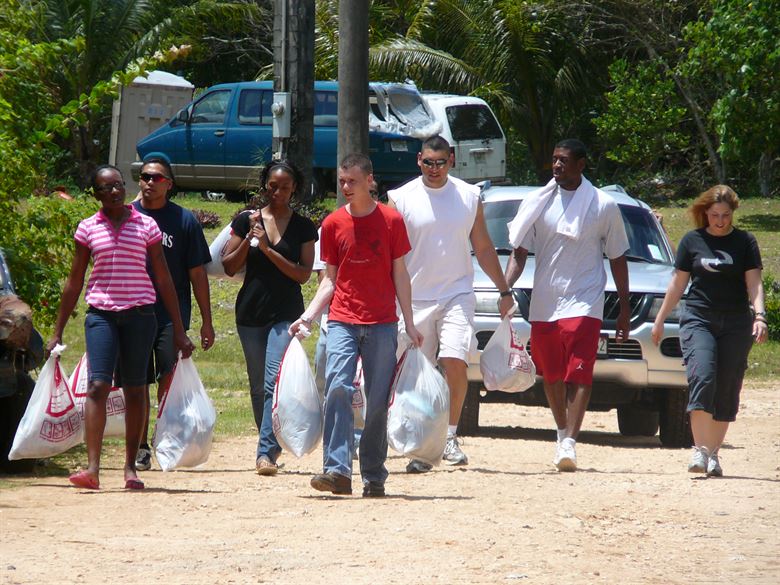It’s one of the most typical images in impact travel; the tourist handing over a big bag of donated stuff to a grateful recipient in a developing country. Big smiles all around. It sure can feel good to give something we don’t need anymore to someone in real need. BeachCorps is developing such a program—but with BIG differences to make sure the donations get to the right place and are effectively used.
It’s true that in many developing countries in-kind donations of school supplies and clothing are very much appreciated. Certainly in an emergency situation, such as after a hurricane, people are desperate, so food and clothing donations are useful (though of course cash donations to worthy relief organizations are even more effective). That’s why donating to trustworthy groups like the Salvation Army is so smart.
The question, however is whether large amounts of donated items during non-emergency situations that aren’t part of some organized system with transparency and accountability and a real plan to make good use of the donations actually do any good. Most of the time, they don’t.
In the Dominican Republic, there is a huge second hand market used clothing, much of it coming from well-intentioned donations from countries like the USA. While this market does create some jobs and income in underserved communities, many people would feel defrauded knowing that the donations they gave had been sold. Often, these sold items come from donations to organizations that portray themselves as nonprofits and claim the donated items will go directly to needy persons, like school supplies donated for kids in schools. Sometimes none of the benefits for intended beneficiaries come to the intended recipients.
Another major problem is that giving stuff for free on a repeated basis can create and expand a culture of dependency in any country, not just developing countries. The classic book on effective volunteer vacations Toxic Charity cautions against free handouts to avoid advancing a culture of dependency.
To give visitors to Punta Cana a way to donate effectively, BeachCorps is developing our Dynamic Donor program, a system to support for donating items via an outstanding Dominican Republic nonprofit, the Fundación Ecoturismo Responsable (Responsible Ecotourism Foundation, or FECOTUR). Donations will support FECOTUR’s Recycling for Education program by bringing school supplies to give to kids who support recycling as well as second hand items for FECOTUR’s planned thrift store sales modeled after a key proposal in “Toxic Charity” that will raise revenue for FECOTUR’s sustainability mission. FECOTUR will receive and process donations with an efficient system promoting transparency and accountability to advance sustainable development. Donations will be sold via mobile thrift stores that one day can be combined with volunteer vacations to help assemble and disassemble the mobile sales markets to ensure that donations reach multiple underserved communities while never putting a single business in those locations out of business because of the competition. These sales at lower-than market prices will also be a direct benefit to poorer communities as well as raising revenue for the great cause of FECOTUR.
#BeachCorps #ALittleGrainofSand #Interact #Recycling #ToxicCharity #SustainableDevelopment #VolunteerVacation #DominicanRepublic #Sustainable #Voluntourism #Voluntourist #FaithBased #Nonprofit #SustainableTourism #SustainableTravel #Culture #ImpactTravel #ServiceTravel #TravelDeep #LittleGrainofSand #Rotary #DynamicDonor


